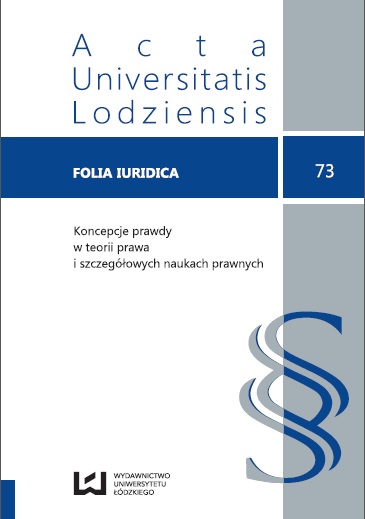Truth is a woman
DOI:
https://doi.org/10.18778/0208-6069.73.02Keywords:
feminism, feminist jurisprudence, epistemology, deconstruction, conception of truthAbstract
The feminist critics of western epistemology reveal political implications of a conception of truth. As a consequence of this a legal process is also in a broad sense inflicted by politics. The feminist jurisprudence claims that the modern law is founded on patriarchal values and interests and neglects voices of social groups which are located on the edge of the society.
Downloads
References
Barnett Hilaire. 1998. Introduction to Feminist Jurisprudence. London : Cavendish Publishing.
Google Scholar
Bartlett Katharine. 2001. Cracking foundations as feminist method.
Google Scholar
DOI: https://doi.org/10.2139/ssrn.274924
Graycar Regina. 2009. The Gender of Judgments. Sydney : Law School.
Google Scholar
Hunter Rosemary. 2010. An Account of Feminist Judging. W Feminist Judgements. From Theory to Practice, red. Rosemary Hunter, Clare McGlynn, Erika Rackley, Oxford : Hart Publishing.
Google Scholar
Levit Nancy, Robert Verchick. 2006. Feminist Legal Theory. New York : University Press.
Google Scholar
Nietzsche Friedrich. 2010. Poza dobrem i złem. tł. Stanisław Wyrzykowski. Kraków : Wydawnictwo vis a vis / Etiuda.
Google Scholar
Scales Ann. 2006. Legal Feminism. New York : University Press.
Google Scholar
Smith Patricia. 1993. On Adjudication: Patriarchy, Neutrality, and Judicial Reasoning. W Feminist Jurisprudence, Oxford : University Press.
Google Scholar
Voet, R. 1998. Feminism and Citizenship. London : Sage.
Google Scholar
Downloads
Published
How to Cite
Issue
Section
License

This work is licensed under a Creative Commons Attribution-NonCommercial-NoDerivatives 4.0 International License.














